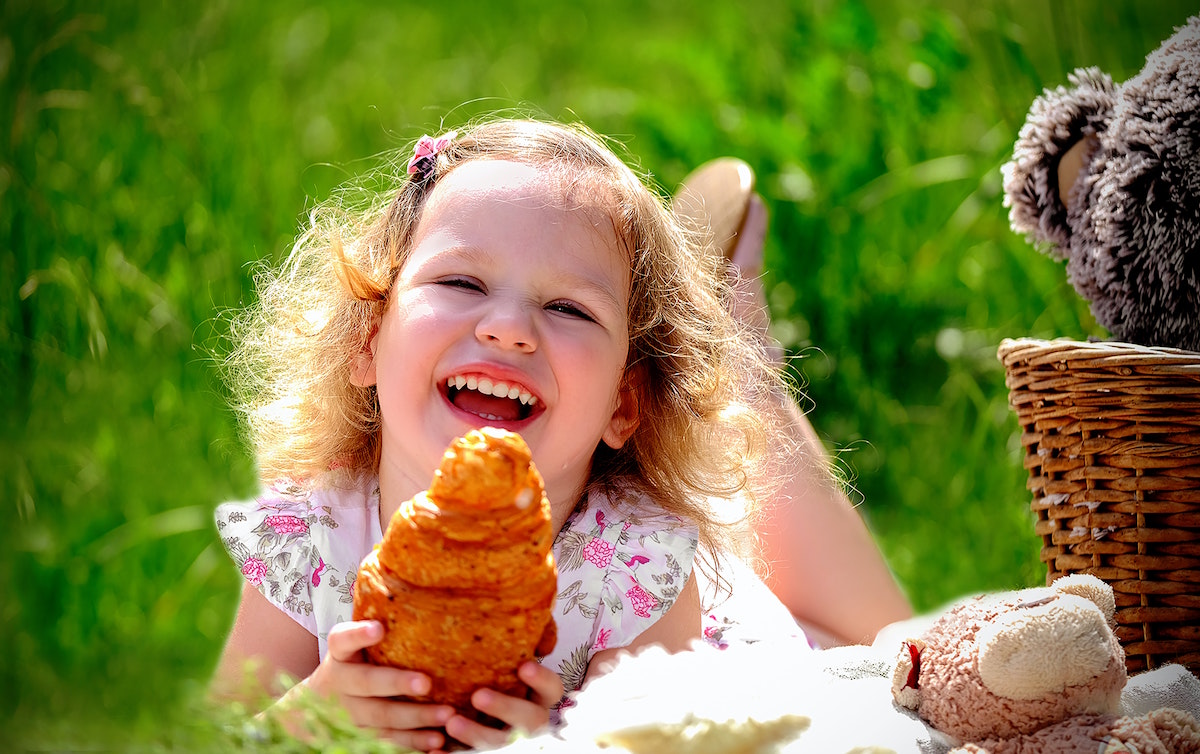Just the other day I received an email from a friend. “I am finally at peace with my body, but now I am struggling with my family. My mother said to my 5-year-old daughter, “Oh my gosh, you’ve gained weight!” My sister is always telling my daughter what she should or shouldn’t eat right in front of me. I don’t want her living a lifetime consumed and stressed about her weight like I was. How can I improve my child’s relationship with food and her body?”
This is an all too common scenario in today’s world. Each day, we’re blasted by the media about the obesity epidemic. Along with the bodies we see in mainstream media, this places a tremendous amount of pressure on parents to make sure their kids “fit into society’s “ideals.”
A troubling paradox
But here lies the problem…the more we try to control our child’s relationship with food and the size of their body, the more disordered their relationship with food and their body will be.
What the research says
In a 2016 study from Eating and Weight Disorders, they asked 501 adult women to recall any comments their parents made to them around eating or body weight.
Women who recalled parents making weight comments were much more dissatisfied with their bodies (regardless of size, shape and weight) than those who did not. Dissatisfaction actually raised proportionately with the amount the parents commented to the children.
The truth of the matter is the desire to be thin actually has its greatest growth between the ages of 5-8 for girls.
It’s important to remember kids this age OBSERVE AND HEAR everything!
They will notice the eating behaviors of their parents, friends, teachers, or friends’ parents.
They will hear negative body talk (a parent looking in the mirror and saying “Ugh, I hate my stomach. I am so fat!”).
They notice how parents talk about and treat others who have lost or gained weight. They are constantly on social media, watch TV, see magazines in the home.
My friend knows this already. Luckily, that means she has a fighting chance for her child’s relationship with food and her body being positive.
But what do we do about family members or other adult figures our children are spending time with?
We do the best we can at home. Period.
The importance of boundaries and your child’s relationship with food and their body

Our best defense is a strong offense. This means modeling healthy, unbiased behavior both at home and when we’re out. We can also step out of our comfort zone and have hard conversations.
These are the boundaries my friend set with her family:
When you’re around my daughter, food and body talk are off-limits.
Period.
This can be tough in many circumstances…and hers were no different. But she feels really good about her decision. She has also received some wonderful support from others who believe in her cause.
I get that we want our kids to grow up in healthy bodies. I get that we want to protect them from harm. And I also get it looks different than what society and the medical profession is telling us–research has proved it!
So what, as parents, can WE do?
Your child’s relationship with food and their body starts with YOU
If we want our kids to grow up with a healthy relationship with both themselves and their bodies, we must show them what that looks like, one parent, one teacher, one coach at a time.
Here are a few tips on what that might look like for you.
1. Notice your own body descriptors.
How do you talk about your body in general?
Do you look in the mirror and smile or do you put your hands on your stomach, sigh with disgust and say this top makes me look fat? Do you pull and tug on your clothes, trying to cover up “trouble” areas?
These subtle images, words, sounds, and looks are all internalized by your children, especially girls… They quickly get the message about what bodies are worthy and acceptable and what bodies are not.
Healing your own relationship with your body is the best place to start. How do you do that? Start by appreciating what your body can do for you, instead of focusing on what it can’t do. It also means working toward body neutrality.
Talking to, thinking about, and treating your body with kindness, gratitude, respect, and compassion–no matter what size it is–will make a big difference in how your children feel in their own bodies.
2. Ask yourself what your relationship with food is like?
Are you constantly on a diet? Do you think about foods as “good” or “bad” or “right” or “wrong?”
Just as thoughts about body size are interpreted by children, so is your current relationship with food.
If children hear things like:
- “I can’t eat that! It’s fattening.”
- “That is not on my diet.”
- “If I eat that will go directly to my hips.”
They will begin to believe weight loss is the ultimate goal. Some will even equate eating food they deem “bad,” as them being bad themselves.
Two outcomes for children who grow up surrounded by diet culture at home
For children who grow up in an environment where one or both parents value dieting and weight loss, there are usually two outcomes:
- The child either becomes a chronic dieter, perpetuating the yo-yo dieting cycle.
- The child decides to rebel and will intentionally find ways to eat foods that are prohibited in the house, whenever and wherever they can. The relationship with food becomes either a comforter to soothe pain, or a secret to hide.
As a role model, generalizing food by thinking of it in terms of energy instead of being good or bad is a great way to start.
From there we can begin to teach our children to honor their own internal hunger and fullness cues. Ask them how foods feel in their bodies. Serve a variety of different foods and offer them some independence of choice.
For more information check out: Raising An Intuitive Eater: What Works With Kids and Teens in Intuitive Eating by Evelyn Tribole and Elyse Resch). Or, check out this post for the basics of intuitive eating.
3. Encourage joyful movement and play

How do you talk and think about exercise?
Is it a “have to” do? Is it tied to how much you ate the day before? Or what you’ll be eating later on? Do you exercise to try to force your body to change? Children may interpret exercise as punishment instead of fun.
Modeling a healthy relationship with movement and exercise helps kids see it differently.
I always start by helping my clients disconnect exercise from calorie burning, losing weight, or trying to change their bodies. I encourage them to start thinking about exercise as just play and movement instead (more on that here).
Our bodies were designed to move and they love to move. In all sorts of ways.
Let your kids see you move your body in non-traditional ways.
Dance in the house, stretch during a commercial, take an after-dinner walk, play Twister with them (good luck with that one). Head outside with your kids to a playground. Show them how much fun moving their bodies can be!
Find more great ideas for FUN movement here.
Want to improve your child’s relationship with food and their body image? Modeling positive body talk, an open friendship with food, joyful movement, and play are three great ways to help take the focus off of weight and put it onto health.
The impact of Diet Culture and Society’s Thin Ideal on our children is so much bigger than I wish it was. That is why YOU make a difference here. ONE PARENT or family member at a time is what it takes to make change.
Let’s do this…together.
If you would like some support in any of these areas schedule a free chat with me, and start becoming your own best friend.
Did you enjoy this article? Don’t miss these similar posts:
5 Steps to Gaining Body & Food Freedom this Summer
How Self-Acceptance is the Road to Better Health & Happiness
Is Your Mother-Daughter Food and Body Relationship Healthy?



I agree with all of your points. Parents must take responsibility for building well rounded, confident, self confident, self loving adults. However, I would caution against setting unrealistic pressures on parents to take on the responsibility for disorders that may be beyond their control. As a parent of a child with a diagnosed eating disorder and an aunt of a niece who lost her battle with depression, it is ridiculously difficult not to engage in self blame. It is not that we did not follow all of the above advice, but that our children have medical disorders that need professional intervention for a health recovery. Please make sure to provide balanced information to preserve parent’s mental health and help identify when additional intervention may be indicated.